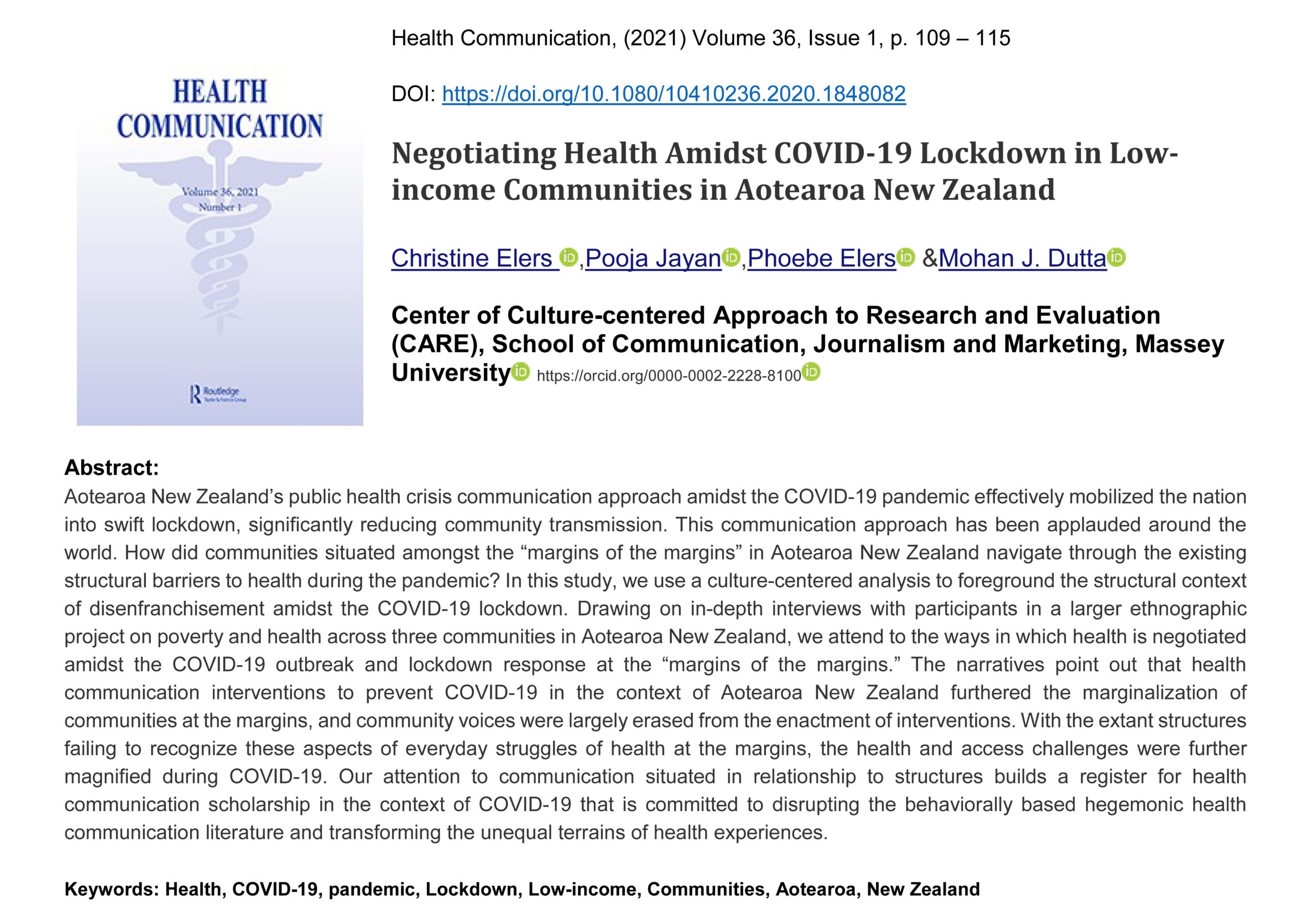Christine Elers , Pooja Jayan, Phoebe Elers & Mohan J. Dutta
Center of Culture-centered Approach to Research and Evaluation (CARE), School of Communication, Journalism and Marketing, Massey University

Abstract:
Aotearoa New Zealand’s public health crisis communication approach amidst the COVID-19 pandemic effectively mobilized the nation into swift lockdown, significantly reducing community transmission. This communication approach has been applauded around the world. How did communities situated amongst the “margins of the margins” in Aotearoa New Zealand navigate through the existing structural barriers to health during the pandemic? In this study, we use a culture-centered analysis to foreground the structural context of disenfranchisement amidst the COVID-19 lockdown. Drawing on in-depth interviews with participants in a larger ethnographic project on poverty and health across three communities in Aotearoa New Zealand, we attend to the ways in which health is negotiated amidst the COVID-19 outbreak and lockdown response at the “margins of the margins.” The narratives point out that health communication interventions to prevent COVID-19 in the context of Aotearoa New Zealand furthered the marginalization of communities at the margins, and community voices were largely erased from the enactment of interventions. With the extant structures failing to recognize these aspects of everyday struggles of health at the margins, the health and access challenges were further magnified during COVID-19. Our attention to communication situated in relationship to structures builds a register for health communication scholarship in the context of COVID-19 that is committed to disrupting the behaviorally based hegemonic health communication literature and transforming the unequal terrains of health experiences.
The trajectories of COVID-19 (C19) as well as the preventive policy responses to it have disproportionately impacted the global margins (Dutta et al., 2020). Across countries, regions, and communities, those at the gendered, raced, and classed margins have borne largely the effects of the pandemic (Patel et al., 2020). Aotearoa New Zealand has been globally recognized for its decisive leadership and the overarching effectiveness of its science-based C19 response, accompanied by clear communication and state-led welfare support (Cousins, 2020; Dutta et al., 2020; PRovoke Media, 2020). How then do inequities in health play out amidst this effective model of C19 response? Traditionally, Māori, Pasifika, and refugee communities have borne the greatest burdens of poor health outcomes in Aotearoa New Zealand (Mahony et al., 2017; McIntosh & Mulholland, 2011; Ministry of Health, 2014). These features of raced/citizenship-based identity intersect with poverty to produce marginalization (Bowleg, 2020).
In this essay, we draw on our ethnographic fieldwork embedded in the culture-centered approach (CCA) with Māori, Pasifika, and refugee communities across three sites in Aotearoa New Zealand to examine the interplays of culture, structure, and agency at the margins in constituting the everyday negotiations of health and wellbeing amidst the C19 outbreak (Dutta, 2020). Our emphasis here is on foregrounding the structural context of marginalization, drawing out the common threads in the diverse experiences with the Whiteness of the pandemic communication response across raced identities at the peripheries in Aotearoa New Zealand that historically bear disproportionate burdens of health inequities (Mahony et al., 2017; McIntosh & Mulholland, 2011; Ministry of Health, 2014). The C19-related advocacy work performed by our academic-activist team emerged out of our advisory group members seeking solutions to the existing and new challenges to health introduced by C19. In this essay, we highlight the structural dimension of the culture-structure-agency framework of the CCA, challenging hegemonic message-based theorizing (Dutta, 2015).
